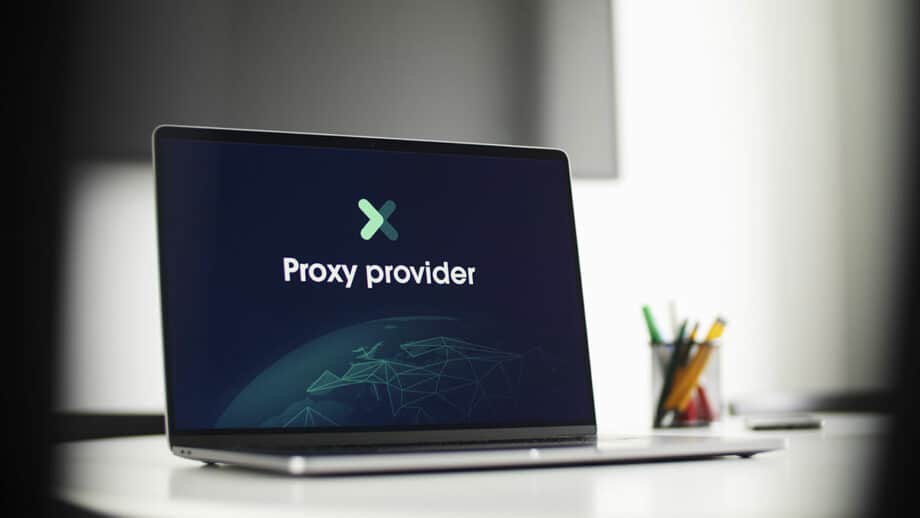Are you tired of slow download speeds and worried about your privacy while using torrent sites? You’re not alone. Many people feel their online activities might be easy to track when they share or download files through peer-to-peer networks.
One key fact is that a proxy can make your identity hard to find by showing the proxy’s IP address, not yours.
This post will show how a proxy server can keep your torrenting safe and faster than before. We’ll tell you why it’s better for anonymity than free proxies or VPNs, especially SOCKS5 proxies for their speed with less encrypting work needed.
Get ready to learn how easy it is to set up and use a proxy for all your torrent needs. Keep reading.
What is Torrenting and How Does it Work?

Torrenting is a way to share files directly between users without the need for a central server. This method uses the BitTorrent protocol, making downloading and uploading large files faster and more efficient.
Users download bits of the file they want from different peers who already have them, rather than getting the entire file from one source. This process happens in torrent clients, software that reads torrent files containing metadata about where each piece of the file lives across various devices.
I once used torrenting to get a big video game update that was hard to find elsewhere. My torrent client connected me to several other people who had parts of this update on their computers.
Instead of waiting for hours or days as I might with a traditional download, I got all the pieces of the update quickly by pulling small bits from multiple sources at once. It showed me how powerful peer-to-peer connections can be for sharing content online efficiently.
What is a Proxy and How Does it Work?
A proxy server stands between your computer and the internet. It hides your IP address, so others can’t see it. Think of it as a middleman for all your online requests. When you use a proxy, first, your request goes to the proxy.
Then, the proxy sends that request to the internet on your behalf. After getting a response from the web, it comes back through the same proxy server before reaching you again. This way, no one can trace who originally made that request.
Proxies are different from VPNs in how they handle data and privacy. While both aim for anonymity and security, proxies change your IP without encrypting data; VPNs do both. HTTP proxies work well with just browsing websites but don’t cover other types of traffic like SOCKS proxies do.
For instance, SOCKS5 proxies help with P2P networks or torrent clients by working at deeper levels – like layer 7 in models used to outline network functions – giving more anonymity across various services beyond simple web pages.
Key Benefits of Using a Proxy for Torrenting
“Imagine surfing the web with an invisibility cloak. Proxies shield your IP address, ensuring your online activities remain a private affair.”ResearchGate
Proxies boost your online privacy when you download files. They hide your IP address and DNS queries. This way, others can’t see what you are doing or track you back. Proxies act like masks, keeping your internet actions secret from everyone.
Using a proxy means you avoid getting slowed down by your Internet Service Provider (ISP). Sometimes ISPs slow down your internet if they see you’re sharing files. With a proxy, your ISP can’t tell that’s what you’re doing.
You also get around blocks on certain websites due to where you live or rules set by the government. Plus, with SOCKS5 proxies, even other people downloading the same files can’t see your real location giving an extra layer of safety.

Proxy vs VPN for Torrenting: Which One Should You Choose?
Deciding between a proxy and a VPN for torrenting boils down to understanding their differences in speed, encryption, and suitability. Below is a breakdown to help you choose the right tool for your torrenting needs.
| Aspect | Proxy | VPN |
| Speed and Performance | Proxies often offer faster download speeds as they do not encrypt data. This means quicker access to torrents, which is vital for users with speed as a priority. | VPNs may slow down your internet connection due to the encryption process, ensuring data security. This trade-off is crucial for those prioritizing privacy over speed. |
| Encryption and Security | While proxies can hide your IP address, they lack encryption. This exposes your internet traffic to ISP tracking and potential cyber threats in torrent swarms. | VPNs excel in security by encrypting all internet traffic, hiding your IP address, and shielding your activities from ISPs and hackers. Features like leak protection and a kill switch further enhance security. |
| Suitability for Different Torrenting Needs | Best for users looking to bypass geo-restrictions and achieve faster torrent downloads without significant privacy concerns. | Ideal for those who value their privacy and seek comprehensive protection against monitoring and cyber threats, even if it means slightly slower speeds. |
From personal experience, using a VPN has consistently provided peace of mind while torrenting. Despite noticing a minor dip in download speeds, the assurance that my activities were encrypted and invisible to my ISP was worth the trade-off. Meanwhile, friends have used proxies for casual torrenting, enjoying faster speeds but acknowledging the higher risk involved.
Choosing between a proxy and a VPN ultimately depends on what you prioritize: speed or security.
Types of Proxies: Which One is Best for Torrenting?
“Torrenting is an art where choosing the right proxy is akin to selecting the perfect brush. SOCKS5 offers finesse and reliability, while the decision between residential and datacenter shapes the style of your digital canvas.”Belurk
SOCKS5 proxies stand out for torrenting. They offer fast speeds and support peer-to-peer connections well. Unlike HTTP proxies, which only mask your IP address, SOCKS5 can handle torrent traffic without issues. From my experience, using a SOCKS5 proxy means fewer errors and better connection quality with your torrent client.
Choosing between free and paid proxies is another key decision. Free proxies might seem appealing for saving money, but they often come with risks like slower speeds and less security. Paid proxies provide better protection against cyber threats and ensure faster downloads.
When comparing residential to datacenter proxies, each has its benefits. Residential proxies use real IP addresses from an internet service provider (ISP), making them harder to block but sometimes slower because of their genuine nature. Datacenter proxies are hosted in large servers offering higher speeds at lower costs but face more frequent blocking due to their recognizability in systems designed to restrict proxy access.
Features to Look for in a Torrenting Proxy
Choosing the right proxy for torrenting helps keep your online activities safe and fast. Here are essential features to look for in a torrenting proxy.
- No-logs policy ensures maximum privacy. A good proxy does not keep records of your internet activity. This protects you if someone tries to track your downloads.
- High-speed connections and unlimited bandwidth are crucial for downloading large files quickly. Look for a proxy that doesn’t slow down your internet speed and lets you download as much as you want without limits.
- Strong security measures protect your data. Encryption and authentication prevent others from seeing what you download or stealing your information.
- Compatibility with popular torrent software makes setup easy. The best proxies work well with frequently used torrent programs, so you don’t have trouble configuring them.
Each of these features plays a vital role in ensuring a smooth, secure, and private torrenting experience.

How to Set Up a Proxy for Torrenting?
“Setting up a proxy is akin to locking your front door – simple, yet essential for peace of mind. With the right setup, you can explore the vast world of torrents securely.”Avast
Setting up a proxy for torrenting starts with choosing the right proxy provider that fits your needs. After picking one, you simply adjust the settings in your torrent application to use the proxy.
Step 1: Selecting a Reliable Proxy Service
Finding a good proxy provider tops the list for setting up a proxy for torrenting. You need to choose services that prioritize security and speed, like SOCKS5 proxies. These types are better because they offer the right mix for downloading files through peer exchange networks efficiently and securely. Make sure the service has a strict no-logging policy to keep your web browsing private.
Check if they allow P2P connections before you commit. Not all providers support peer-to-peer file sharing, so it’s critical to confirm this detail first. Once you find a service that fits these needs, sign up and get your login details.
These include an IP address, port number, username, and password – key elements needed for proxy configuration in torrent clients later on. Paid services usually offer stronger encryption and are less likely to log your Internet activity than free proxies do.
Step 2: Configuring the Proxy in Your Torrent Client
Open your torrent client, like uTorrent or BitTorrent. Go to the settings menu. Here, you will find a section for proxy server setup. Input the details of your proxy service such as its IP address and port number.
For users of qBittorrent, the steps are similar. Access the options panel in qBittorrent to find network settings. Enter your proxy’s information here too. Make sure you select SOCKS5 or HTTPS based on what your proxy provider supports.
If you use other popular torrent tools, they all have a place in their settings for this purpose too. Always enable proxies for peer connections if it’s available in your software choices.
This setting makes sure all parts of your torrent activity go through the anonymity network.
Step 3: Verifying Your Proxy Connection
To make sure your proxy is working, first check if your IP address changes. This step is key for hiding your real location. You can use online tools like torrent IP check tools or DNS leak tests.
These help confirm that no one can see your real IP address or find DNS requests that might show where you are.
Another important part is testing download speeds and connectivity to ensure the proxy doesn’t slow down your internet connection too much. My experience showed that good proxies should not significantly decrease speeds.
Regular checks keep you safe and make sure everything works as it should during torrenting sessions.
Avoiding Common Mistakes When Using a Proxy
Utilizing a proxy for torrenting aids in masking your internet activity, thus enhancing safety. Plenty of individuals commit errors that could potentially lead to problems or decrease their privacy. Here are vital points to prevent such occurrences:
- Constantly activate proxy authentication. This secures your connection and bars unauthorized access. Absence of it could potentially lead any person to utilize your IP address for illicit activities.
- Verify DNS leak protection. It halts external requests from disclosing your actual IP address during torrenting. This characteristic is indispensable for preserving online anonymity.
- Confirm the proxy is operational prior to initiating any downloads. Once, I neglected this step and unintentionally exposed my true IP address to a torrent swarm, putting my privacy at risk.
- Select a trustworthy proxy provider. Inexpensive or cost-free proxies often log user activity or possess inadequate security, leading to bans or identity disclosure.
- Implement the correct type of proxy for torrenting, like SOCKS proxies, which are constructed for peer-to-peer connections and ensure faster download speeds without jeopardizing your anonymity.
- Change your proxy settings periodically to avoid being detected by copyright infringement agencies or cyber intruders searching for vulnerabilities in fixed connections.
- Refrain from using transparent proxies since they fail to effectively conceal your IP address, making your online activity observable to any person supervising the network.
- Ensure adherence to lawful standards prior to torrenting to avert legal repercussions related to copyright laws or terms of service breaches.
- Refrain from flooding websites with inquiries via your proxy server, as this can flag you as dubious and restrict your internet access.
- The practice of rotating proxies helps avoid detection from websites that block users with repeated visits from an identical IP address.
Adherence to these guidelines will significantly diminish risks while utilizing proxies for torrenting and guarantee a more secure experience online.
Additional Security Measures for Safe Torrenting
“Navigating the torrent landscape requires a discerning eye – choose reputable sources as your compass to avoid digital pitfalls.”NIST
Safe torrenting requires more than just a proxy. Users should take extra steps to protect their privacy and avoid malware. Here are additional security measures you can take:
- Combine a proxy with a VPN service for extra protection. While a proxy hides your IP address, a VPN encrypts all your internet traffic. This double layer of security makes it harder for cybercriminals to track or intercept your data. I’ve used this method many times and found my torrenting activities remain anonymous.
- Use a torrent-friendly antivirus program. Not all antivirus software tolerates torrent downloads, so pick one that does. A good antivirus can scan downloaded files for viruses and malware before they cause harm.
- Choose reputable torrent sources. Stick to well-known sites that have a history of being trustworthy. These sites often check their torrents for malicious content, reducing the risk of downloading infected files.
Following these steps will greatly improve your safety while enjoying the benefits of torrenting.
Conclusion

A proxy keeps your online file sharing private. It replaces your real IP with its own. This trick makes tracking your torrent activities hard. SOCKS5 proxies are best for this, speeding up transfers without slowing you down with extra security steps.
When setting one up, choose a good service and make sure it works in your torrent program.
Using the right settings can stop unwanted snoops on your internet use. Paid services often offer better safety and help than free ones do. Check your setup often to keep safe from prying eyes.
For those serious about keeping their online actions anonymous, following these tips is key. It’s not just about hiding what you download but making sure no one can track any of your internet activities back to you.
Feel confident as you share files peer-to-peer, knowing that taking these steps helps protect your privacy online. Let these practices be a shield for all the data you send and receive through torrents.





